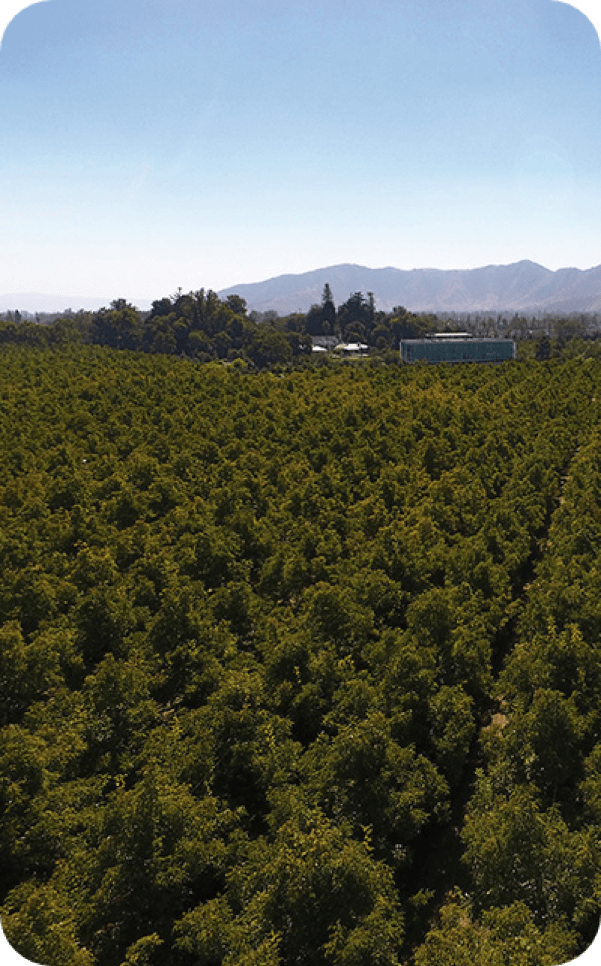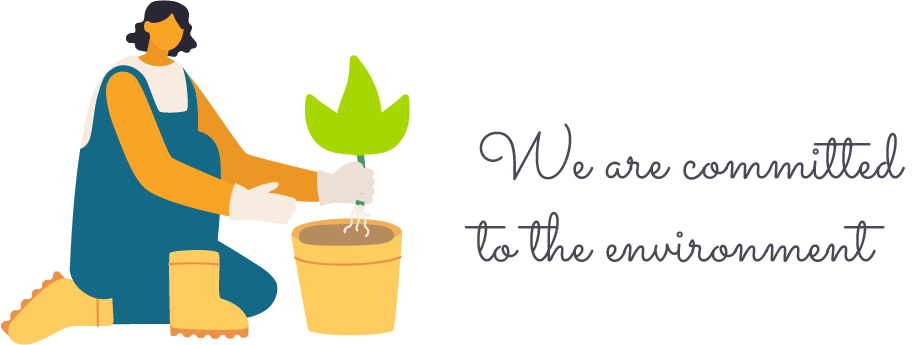
1. Climate Change
Climate change poses one of the most critical challenges for humanity and as businesses we have an essential role to play in combatting it. Today our company has an Environmental Management System based on policies of continuous improvement, created to guarantee care of the environment throughout our operations.
Our journey has started with ongoing improvement processes since 2020 and we are now working on our first Corporate Climate Change Policy which will be our route to adapting to and mitigating against climate change and will help us to establish clear, concrete targets over time. With the focus that is being placed on this we expect to complete this during the 1st quarter of 2022.
Our 2030 Sustainability Agenda Emissions Commitment is to reduce greenhouse gases by 20%
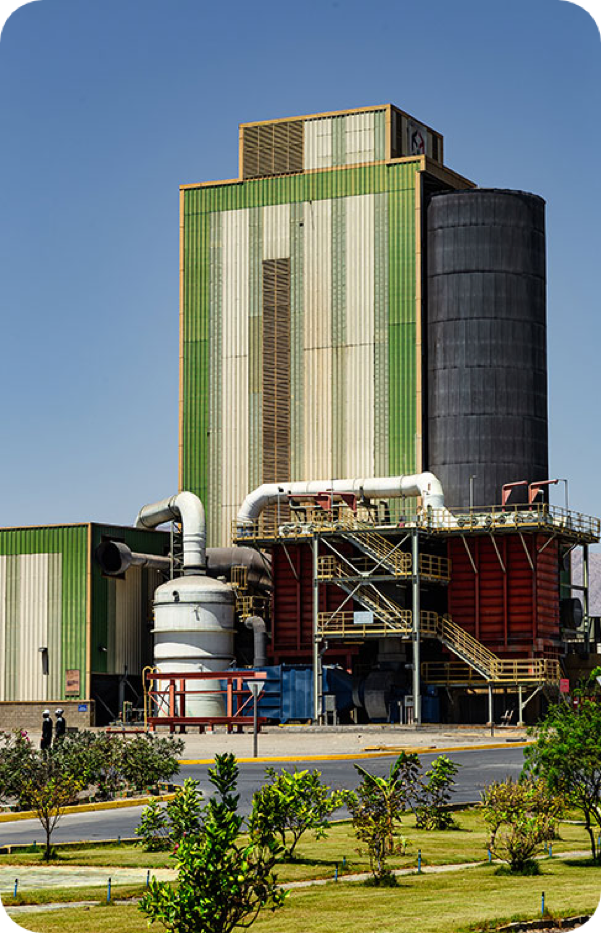
Carbon footprint
We constantly monitor our carbon footprint looking to reduce our emissions. During 2021, all our subsidiaries completed greenhouse gas inventories for Scopes 1 and 2 direct and indirect impacts on the atmosphere. In addition, our MolymetNos, Molynor, Molymex and Molymet Belgium subsidiaries have carried out measurements for scope 3 indirect greenhouse gas emissions.
During 2021, the total scope 1 and 2 emissions at Molymet correspond to 76,646 tons of CO2 equivalent.
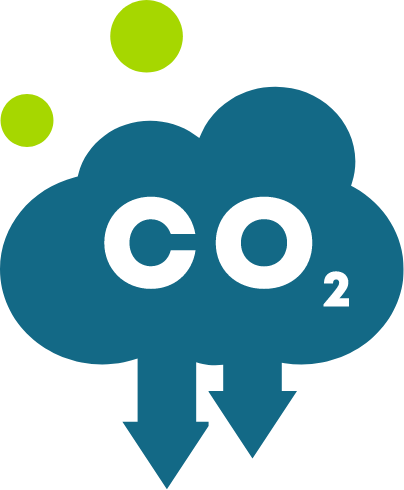
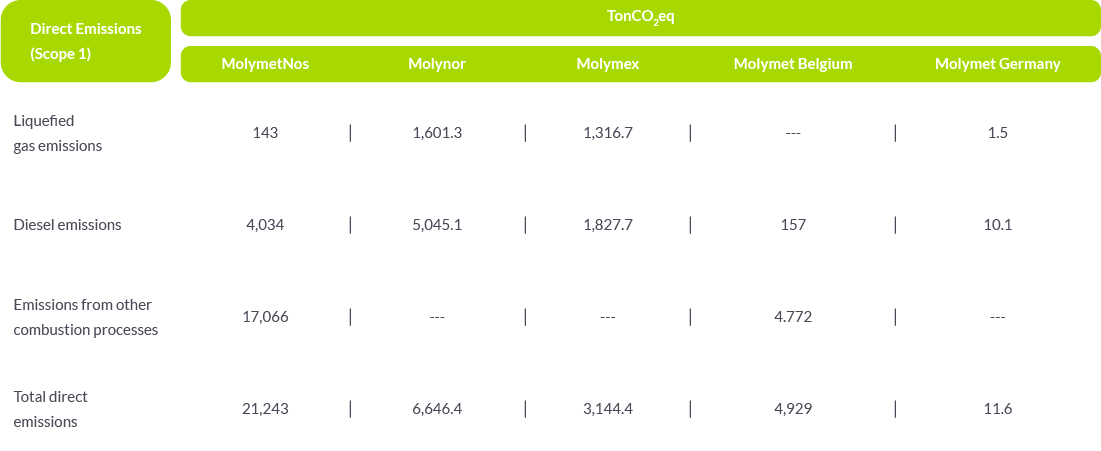
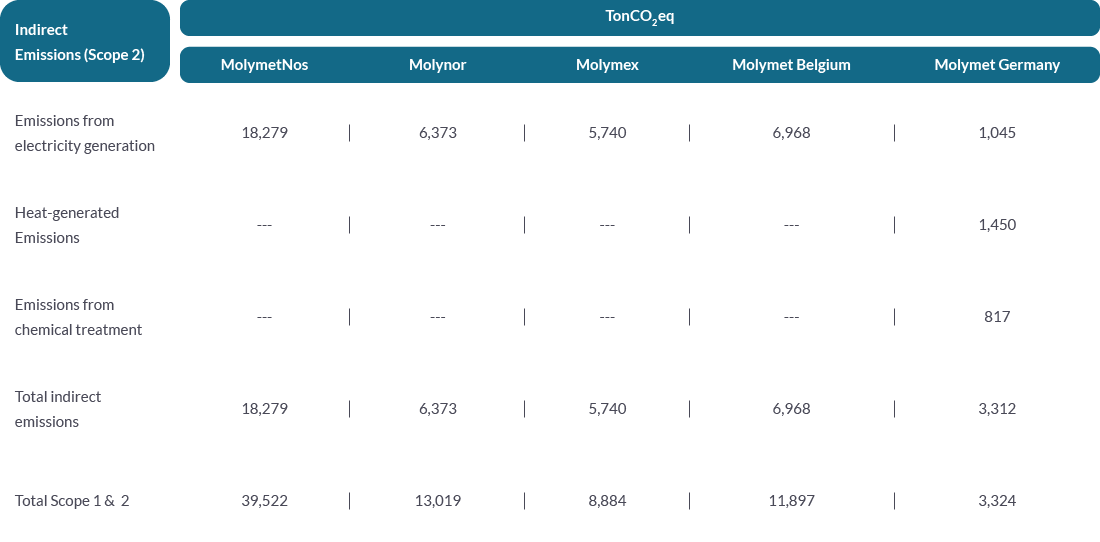
The above calculations followed the Greenhouse Gas protocol and were compiled on the basis of data for 2020, and in 2022 we will continue with the quantification for 2021. The Scope 3 calculation will be published once we have verified the 2021 carbon footprint data.
MolymetNos and Molynor received “Huella Chile” certification for quantifiying Greenhouse Gas emissions
Huella Chile, a program of the Chilean Ministry of Environment was developed in response to provide appropriate support and tools to public and private organizations for the reporting and management of Greenhouse Gas (GHG) emissions
The objective of this voluntary program is to support and encourage voluntary management of GHG emissions, carbon footprint calculation and standardized reporting formats
In this context in 2021 the HuellaChile Quantification Seal, was awarded by the Chilean Ministry of Environment to Molynor and MolymetNos for having achieved quantification of their greenhouse gas emissions. For us as company, this is the first step towards initiating actions to reduce our GHG emissions.
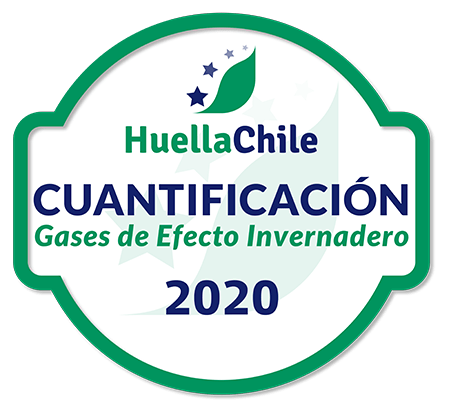
Other significant emissions
Today our SO2 emissions are 77.7% below the minimums established by current permits.
Our reduction commitment considers all types of emissions from Nitrogen Oxides (NOx), Sulfur Dioxide (SO2) and Ammonia (NH3). In 2021 our emissions totalled 25.7 tons of NOx and 620.4 tons of SO2, generating a reduction of 28.6% and 24.1% respectively compared to 2020.
We also maintain 98% efficiency in SO2 recovery at our scrubber plants where we generate sulfuric acid (H2SO4) as a by-product. This is then sold or used in our own operations.
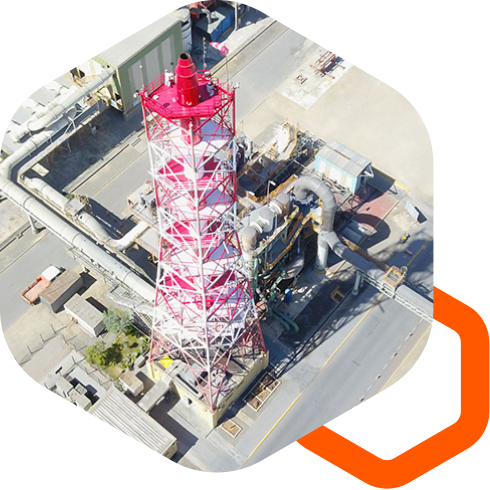
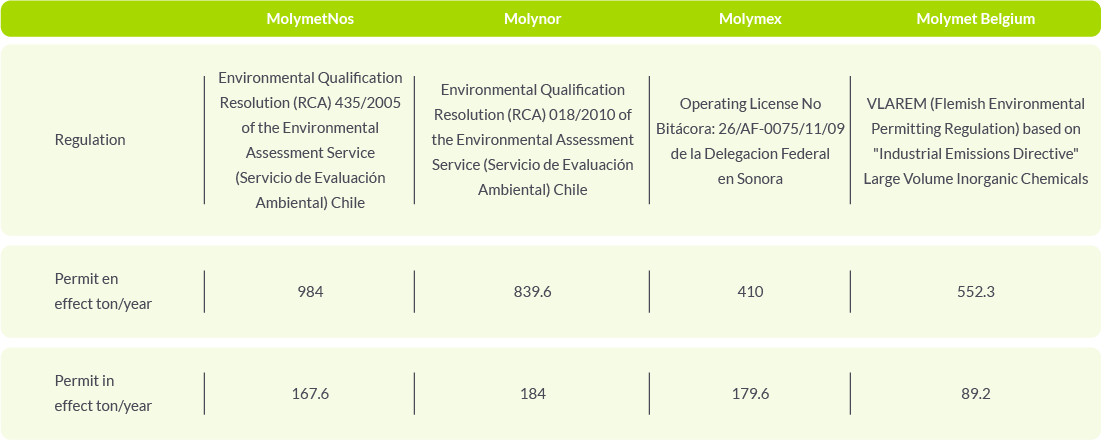

To be precise, we note that the lower SO2 y NOx emissions were mainly due to lower production in 2021. Nonetheless we are committed to voluntary reduction of our emissions via various initiatives, one of which is detailed below:
MolymetNos Project to reduce SO2 emissions
Approximately US$60 Million has been invested in:
The Modernization and Strengthening of Gas Cleaning Systems and Roasting Facilities at MolymetNos.
The rationale behind this, our biggest project in decades, was to ensure reliability and operational sustainability and to go way beyond current environmental regulations by voluntarily reducing MolymetNos’ sulfur dioxide (SO2) emissions by 40%. In 2021 we received a favorable Environmental Qualification Resolution (RCA) to go ahead with this project. Site work has begun and Phase 1 is Scheduled for completion in 2024
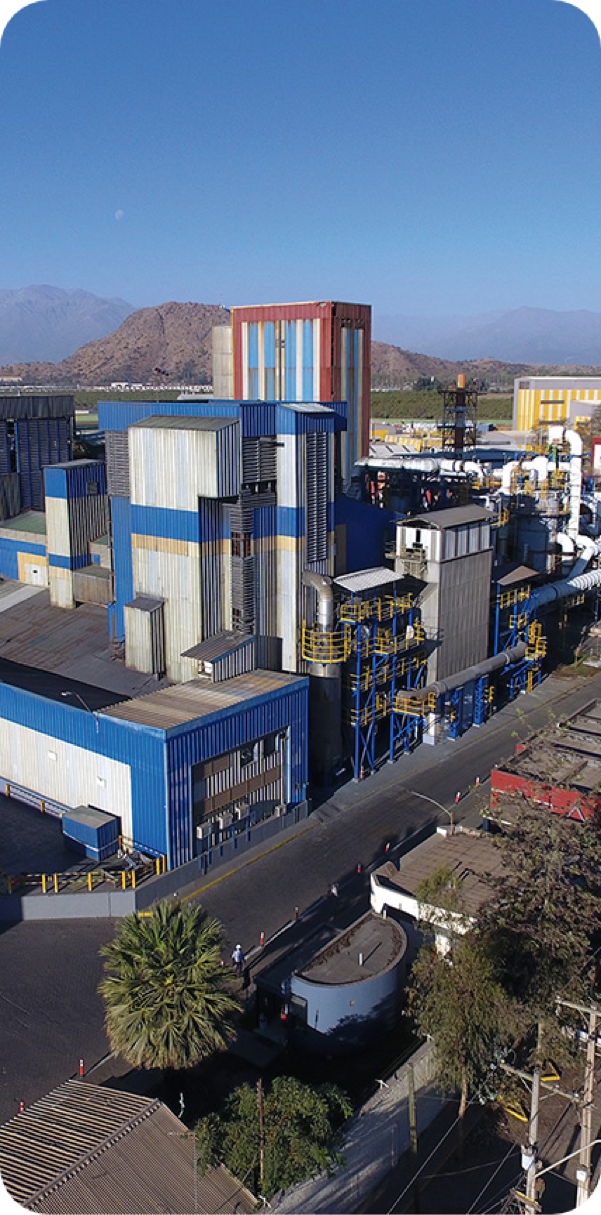
Zero emissions at Molymet Germany
Unlike our other subsidiaries, Molymet Germany does not produce any emissions at all because it does not have roasting processes The values indicated in previous years for SO2 and NOx correspond to emissions generated in the production of electricity and natural gas.
2. Responsible use of resources
Raw Material: Molybdenite
Our raw materials are the first part our processing change where mineral contents of molybdenum go through various transformation processes to produce products and byproducts mainly destined for metallurgical, chemical and metal industries. By the end of our processes, we deliver products of the highest quality, meeting the highest sustainability standards and parameters. We act responsibly seeking to reach 100% reutilization of molybdenite and minimize waste generation through valorization.

Energy
Our Corporate Energy Policy guides our ongoing search for more sustainable energy systems. This past year we made a specific commitment to convert to 60% renewable energy use by 2030.
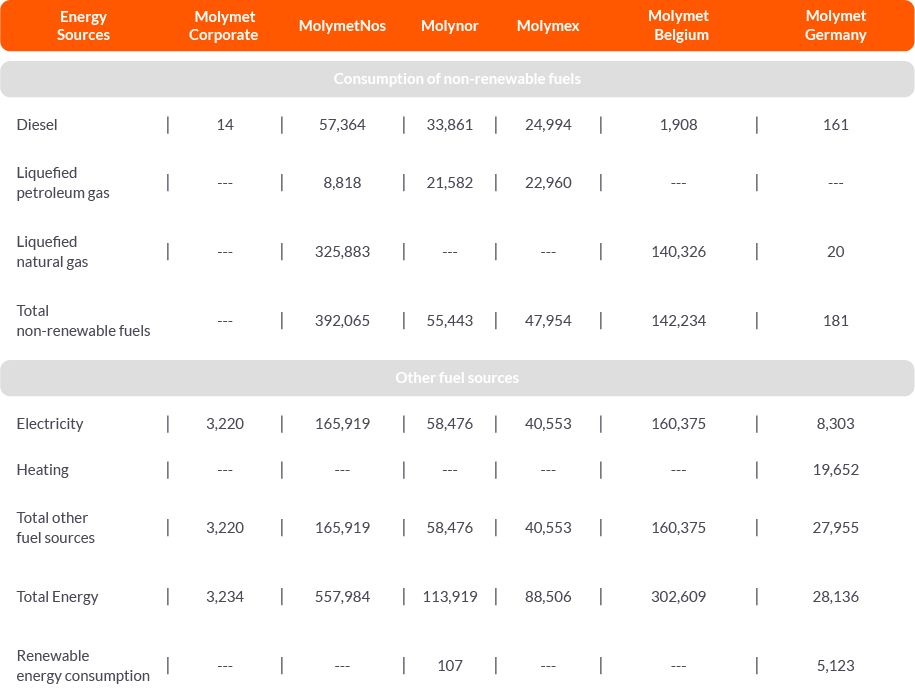
In our Strategic Agenda, we set ourselves the goal of reducing energy consumption per unit processed and each subsidiary defined a specific reduction target between 1% to 3%, according to their local realities.
After carrying out a series of initiatives to meet the proposed targets, our subsidiaries achieved a total energy reduction of 5,408.7 GJ in 2021.

Progress on ISO 50001 Energy Efficiency Certification
The ISO 50.001 standard establishes an international framework for improved energy performance, reducing energy consumption and greenhouse emissions.
The Chilean Energy Sustainability Agency (ASE) awarded our subsidiaries, Molynor and MolymetNos co-funding for the implementation and certification of an Energy Management System based on the ISO 50.001 standard. This benefit enables us to prepare for compliance with the new 2021 Chilean Energy Efficiency Law.
Molymet Germany has been ISO 50.001 certified since 2015. Molymex is evaluating its implementation and since 2018 Molymet Belgium has participated in the Belgian government´s EBO energy reduction agreement.
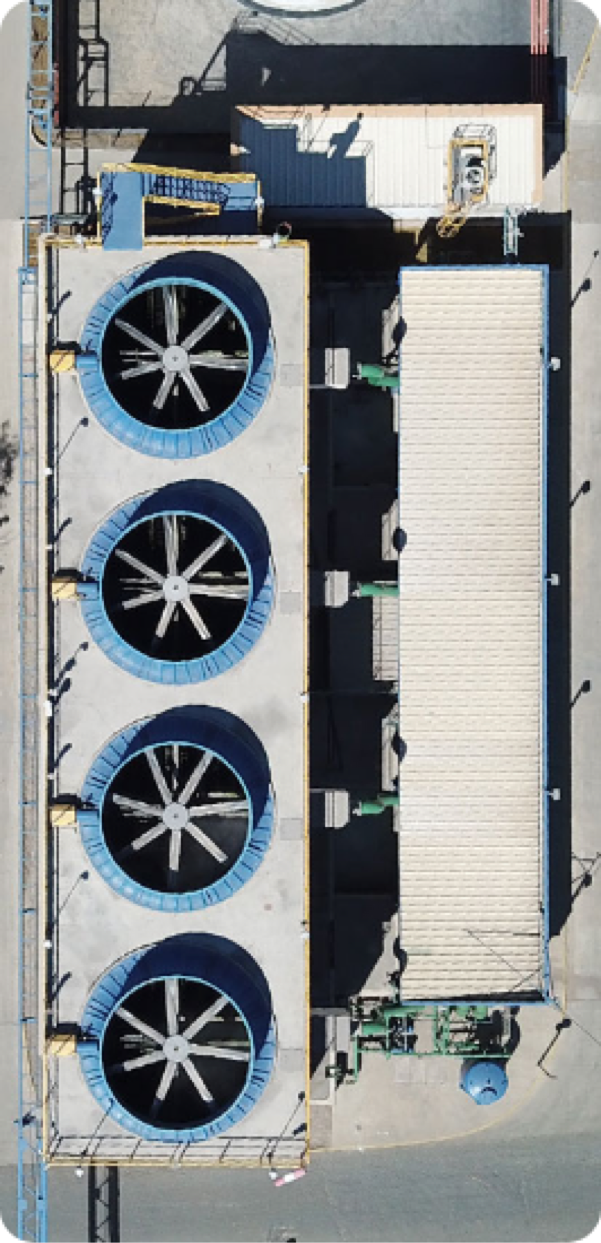
Water
Given the scarcity of water resources, especially in certain countries like Chile because of its geographical characteristics and exposure to climate change.
Given the importance of this resource and its efficient use, it has become on of our main environmental priorities.
To this end, we are working on cutting our water consumption at all our operations by recycling and recirculating water and developing specific plans aligned with this objective. In this sense we have made steady progress with water recirculation at our productive plants, currently having achieved 39% and 18,2% respectively at a consolidated level.
Here we highlight our water treatment at MolymetNos and its ongoing optimization as well as the use of seawater at Molynor by means of desalianization.
In this respect, we have made a specific commitment relating to the efficient use of this resource – increasing the percentage of recirculated water and reducing intensity. For more detail, please take a look at our 2030 Sustainability Agenda in chapter 3.
Our 2030 Sustainability Agenda Water Commitments are to:
Recirculate 64% of water used Reduce water intensity by 10%
Water as a shared resource
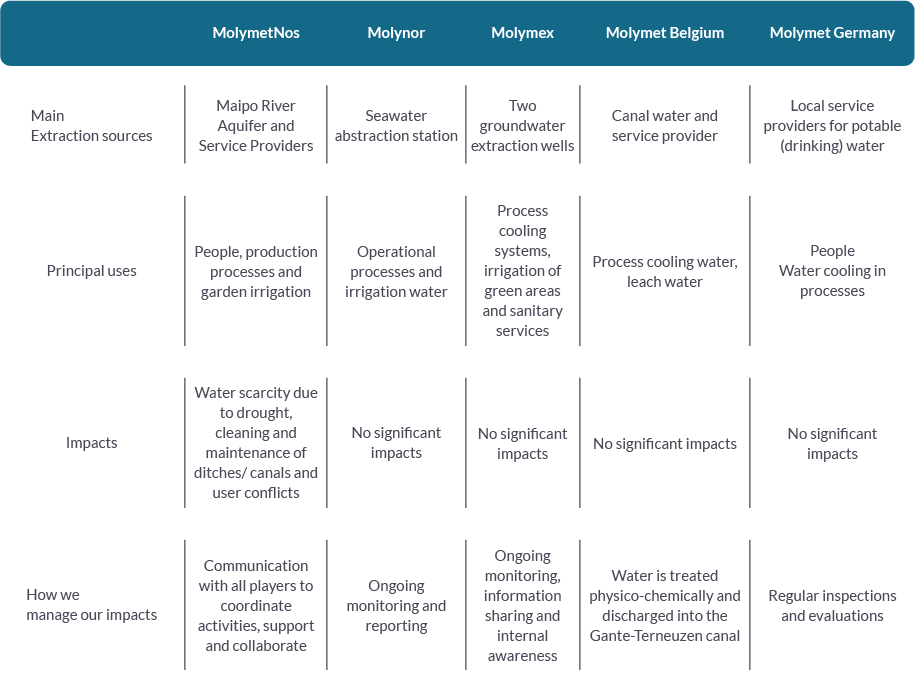
Water Extraction in m3 / year
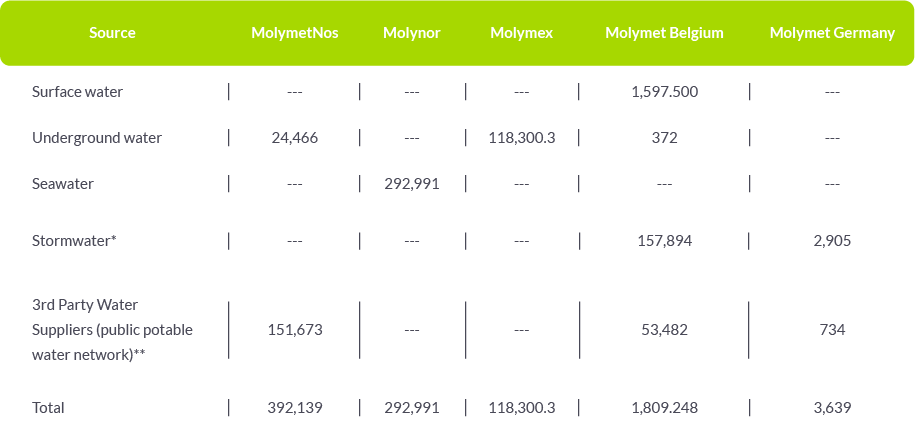
* Industrial water from third parties.
**Municipal water suppliers, municipal wastewater treatment plants.
This indicator does not include water used by the Corporate Building which corresponds to a volume of 4.259 m3.
Water Recirculation
All our subsidiaries have water recirculation systems, allowing us to reuse this resource while reducing its consumption in our operations:
MolymetNos
- Carried out a water balance to determine the recycled and recirculated water, resulting in all the treated water being reincorporated into the process.
- Consolidated a Long-Term Water Management program with actions to secure external supply and new non-conventional sources; digital transformation; and the establishment of Water Committee made up of professionals with expert knowledge in this field.
Molynor automated its wastewater treatment plant, allowing pH control and improved measuring with both remote and on-site operation.
Molymex continued with the recirculation of water from toilets and evaporation capture from cooling systems resulting in a 9% increase in recirculation.
Molymet Belgium
- Conducted a water flow audit this year where all water flows were investigated and possible reduction and reuse measures were assessed.
- The Purox plant due for startup at Molymet Belgium will use several recirculation loops and all cooling water will be reused through closed cooling towers.
- Joined the “Blue Circle Water” project, a three-year initiative to look at models of collaboration between different stakeholders like universities, neighboring companies and other entities aiming to reuse water and reduce consumption.
Water consumption in m3 / year

Molymet Belgium committed to good use of water resources
At Molymet Belgium we know that consciously looking after water became even more important in the context of the pandemic. This is why we decided to participate in the “Blue Circle Water” project with this as a focus for the years´planned activities.
This initiative of three years duration, researches ways of collaborating with different interested parties like universities, neighboring businesses and other entities to reutilize and reduce water consumption. For instance, the use of rainwater. In addition, the project shares pilot installations for the study of water reutilization, the valoraization of residual water and the use of treated rain water. This network for learning about water was an industry initiative. In essence, having this kind of network is highly valuable and we have already participated a lot in different instances. At one of the monthly meetings held in Ghent we shared and discussed experiences and problems with all the other companies, sharing projects underway and previous projectsaimed at reusing water and reducing consumption. There was also discussion about legislation relating to water.
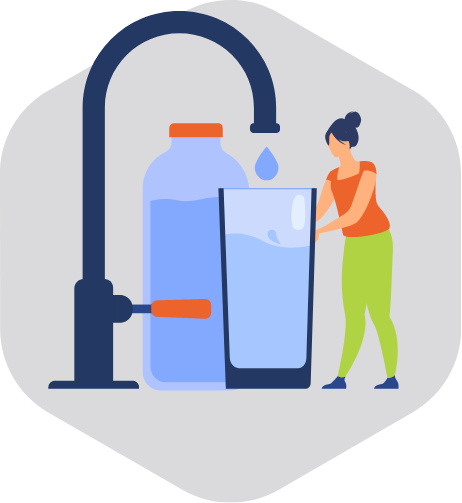
Molymex, Clean Industry
In 2020 Molymex received PROFEPA Clean Industry Certification (performance level 2) for the 19th consecutive year. This is granted by the Mexican Federal Environmental Protection Agency (PROFEPA) under the Voluntary Environmental Audit Program.
The certification involves an integrated, systematic, objective and documented evaluation with respect to the way a company, its employees and teams operate with the goal of protecting the environment.
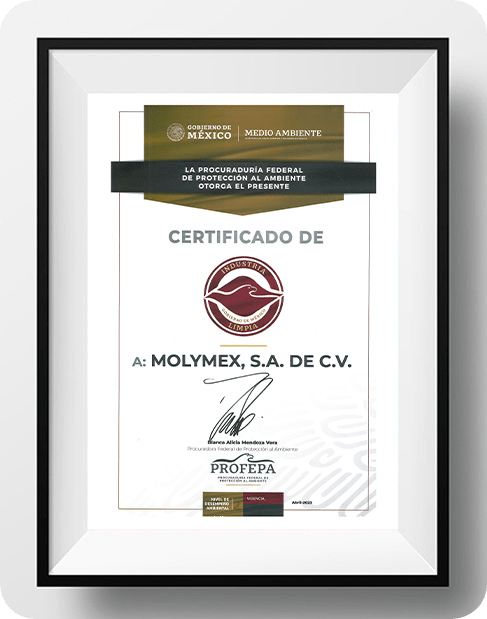
3. Waste Management
Reutilization and recycling
All subsidiaries actively carry out procedures to recycle and/or reuse waste from operational processes. This means we are able to significantly reduce overall expenses relating to primary materials, transport and energy.
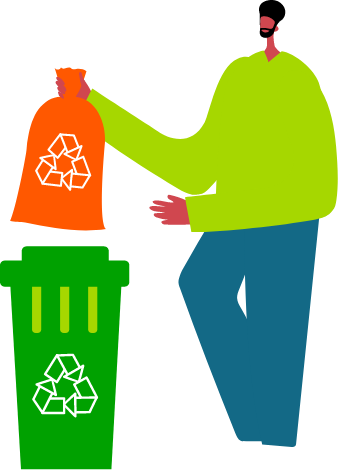

Note: The weight or volume of the total materials valorized at all our subsiidiaries corresponds to 12.358,52 Tons
Molynor Waste Valorization
In 2021 Molynor reached an important circular economy milestone. We managed to avoid dumping 107 tons of waste by recycling material derived from steel, maxi sacks and unused batteries. Similarly, we recycled molybdenite via vacuuming particles, thereby extending its use.
MolymetNos Waste Valorization
As part of the continuous search for waste recovery alternatives, MolymetNos gave each employee a 6-liter biodegradable bag of compost generated from disused pallets. This equates to more than 250 tons of waste not dumped in landfills.
Similar recycling initiatives underway include the reuse of maxi sacks, electronic equipment and devices, lime slurry, scrap metal and plastic drums.
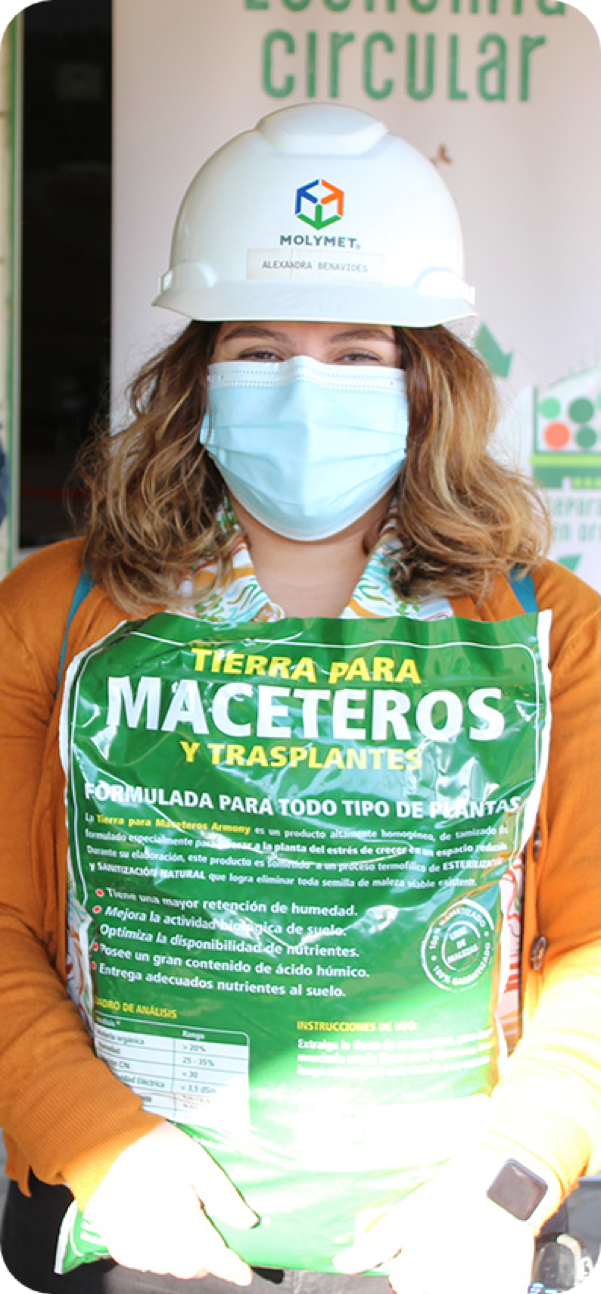
Waste Generation
Producing molybdenite invariably implies the build-up of solid waste, which is separated into categories and independently managed according to respective hazards and valorization potential. We strive to minimize negative environmental impact by either valorizing or disposing of waste in environmentally-friendly sites. This is outlined in the tables below:
Waste generated in Tons

Waste by disposal method in tons
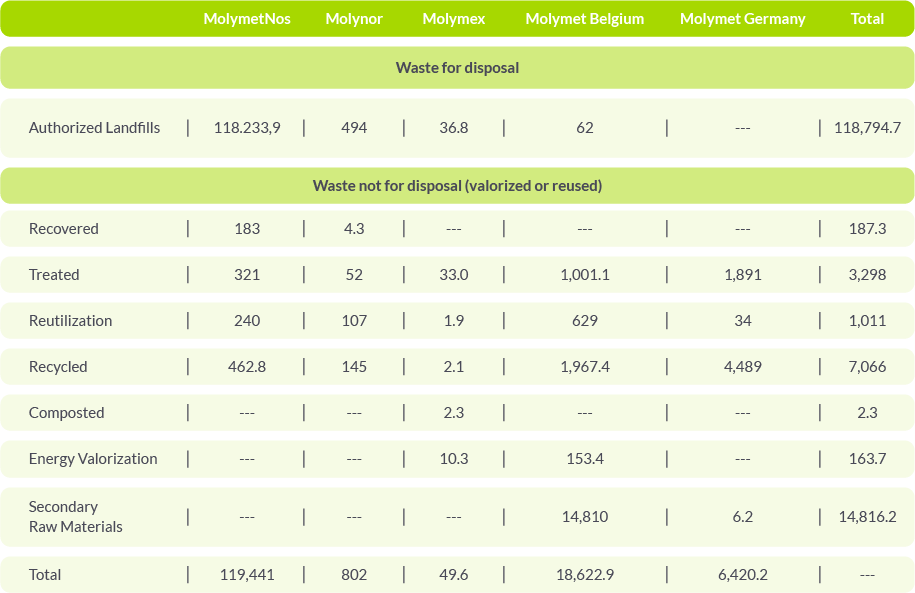
Effluents
Prior to being released, all water waste must be adequately treated to limit contamination as far as possible. We only discharge water waste at three of our five subsidiaries in compliance with local environmental regulations and the effluent discharge parameters stipulated in the Waste These parameters are continuously tested and analyzed by external laboratories.
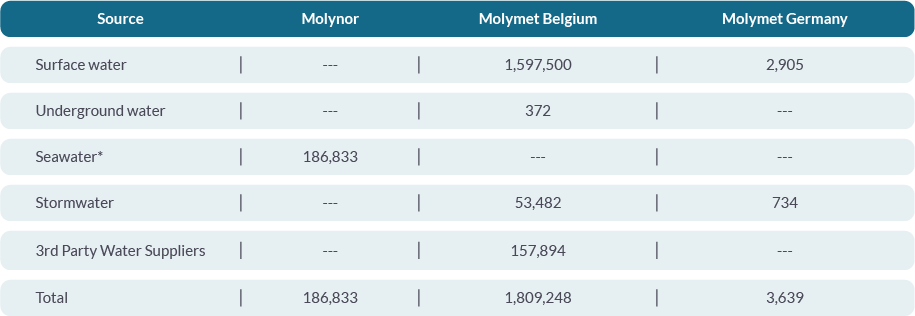
*Brine produced in the reverse osmosis process is discharged into the sea.
At Molynor, there were three Ferrous Chloride spills deemed serious as per the Hazardous Substance Storage Regulation (SUSPEL). The spills totaled 20m3, 3m3 and 5m respectively and caused contamination of the surrounding soil. In order to prevent such incidences from taking place in the future, we continue to follow the guidelines presented in PR-SIGNOR-014, ‘’Hazard Management Procedure”, and investigate each incident.
At Molymet Belgium there were five spills deemed serious, totaling 2.400 liters of hydrochloric and sulfuric acid. Three of these spills occurred at the Purox plant and were thoroughly cleaned to prevent significant damage. However, the 4th spill – containing liquid with molybdenum residue – leaked into a nearby sewerage system. This caused a slight increase in the Molybdenum content of our wastewater in terms of legal limits. The 5th incident was a sulfuric acid spill onto a paved area at the main Purox building. No serious impact was reported. Despite these unfortunate occurrences, Molymet continues optimizing it’s contingency plans around protecting people and the environment.
Managing Waste Impacts by Subsidiary
4. Biodiversity
Biodiversity plays an important role in the functioning of ecosystems, including nutrient and water cycling, soil formation and retention, resistance to invasive species, plant pollination, climate regulation, pest control and pollution.
We want to leave a positive environmental legacy for future generations as we operate and grow our business. Here are some of the ways the Molymet Group helps to conserve the ecosystems and green spaces we share with others.
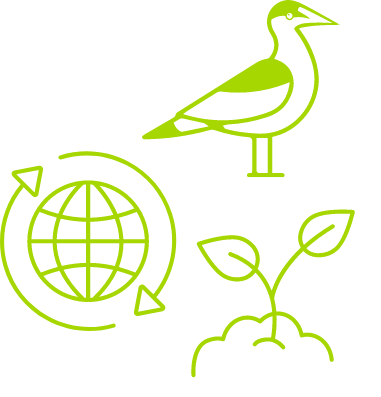

Currently no negative impacts on biodiversity have been identified.

Foundation for the protection of the Little Tern
As Molynor, we want to proudly highlight our contribution to the conservation of the Little Tern, a migratory bird Gaviotín chico (Gaviotín chico) which is in critical danger of extinction. At Molynor, we continued our activities as co-founders of the Foundation for the Protection of the Little Tern. During 2021, we invested US$ 49,710 in the protection of this species in accordance with Chilean Environmental guidelines.
Although the conservation focus is on the Little Tern, the bird coexists with other fauna among archaeological sites of great importance. This is why in an initiative led by the former Minister of the Environment, Carolina Schmidt, we have begun the process of declaring the nesting area of the little tern as a nature sanctuary.
The Real Right of Environmental Conservation
Concluded by our subsidiary Inmobiliaria San Bernardo S.A in 2021, this is a legal instrument which has formalized our efforts to conserve the environmental and ecological heritage within the San Bernado urban area surrounding our corporate building and the MolymetNos operational complex. Under this agreement, the landowner permanently restricts the development and future use of their land, to ensure its protection and conservation. We are proud to be the first company to implement this conservation right in the Nos Community.
Read more in Chapter 7: Inmobiliaria San Bernardo S.A.
